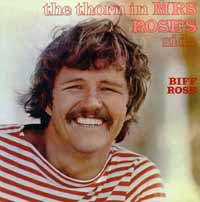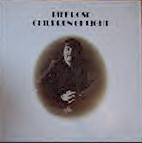Biff Rose
Albums reviewed on this page:
The Thorn in Mrs. Rose's Side, Children
of Light, Biff
Rose.
All in all, I do not really know
much about Biff Rose. He is from New Orleans, and was doing
satirical songs in the New York coffeehouse scene in the mid 60s
armed with a banjo. Somewhere down the line he dumped the banjo
for a piano and went to California, where his oddball approach fit in
well with the hippy movement. His piano work is distinctly
non-rock, more the sort of thing that movie directors want when they
ask for "old-style romantic love theme," but combined with
his odd twangy vocals (he would sneak up into a goofy falsetto
occasionally) and good-natured material and attitude, it isn't hard
to see why he was a success. I've read that he appeared on
Carson's Tonight Show a dozen times in this era, although
whether he was considered comedy, music, or both is uncertain.
His most famous song is "Fill Your Heart" - mainly because
David Bowie covered it on Hunky Dory. Otherwise, his
impact on the rock scene is minimal. You could try and fashion
an argument that his piano style would later be echoes by Rick
Wakeman (on Bowie's album) and Keith Emerson, but I think that is
more coincidental than causal. However, even if he didn't
produce any overwhelming influence, Rose is still an entertaining
listen today.
It seems that his early work has
gone out of print (at least in the US), so I don't know how easy it
is to track his stuff down.
 Biff
Rose is the Thorn in Mrs. Rose's Side (1968), ****
Biff
Rose is the Thorn in Mrs. Rose's Side (1968), ****
Rose
was among the hippie crowd, and accordingly he was full of good
intentions and gentle pokes at the world. Most of this album
was likely drawn from his humorous nightclub act ("Mama's Boy",
the staged reading of "Paradise Lost", or the LAPD satire
"Buzz the Fuzz") with strings, horns, drums, etc. added.
It also contains his most famous song, "Fill Your Heart,"
which was later covered by Bowie on Hunky Dory.
A honky-tonk pianist with
a voice that was well, imprecise, does not sound like a recipe
for successful music, but Rose is so darn joyful he overcomes his
shortcomings. He was a happy, uplifted person and he wanted
you both to know it ("It's Happening"), and to know why
(the hippie philosophy of "The Man"). At all times
one can tell that Rose sincerely means what he was singing, which
differentiates him from a lot of people. Thorn is not
entirely happy, as a few tracks show themes which would later appear
in his work (the sad romance of "Molly", or the uncertainty
of "What's Gnawing at Me"), but they are still good songs.
All in all, an enjoyable album from a hippie piano troubadour.
Produced by a pair of ex-New Christies Minstrels, Nick Woods and Art
Podell. (Tetragrammaton T-103).
 Children
of Light (1969), ***1/2
Children
of Light (1969), ***1/2
Part
Tom Leherer, part Tiny Tim, part left-wing hippie, and part romantic,
Biff Rose is a unique singer-songwriter almost in the fullest sense
of the word "unique." He was a romantic with a good
sense of humor, reacting against what he perceives as the troubles of
his times. Rose is not a rock musician, nor is this rock music,
either in structure or in presentation. His mostly
unaccompanied piano work is best described as Old World - the sort of
music found in old movies, but very competent and respectable.
Think of a less frilly version of Rick Wakeman's work on Hunky
Dory, or Keith Emerson's piano stylings. Rose, however, was
certainly a goofball, and the two best tracks on this album capture
him as such. The opener "Ain't No Great Day" (with
Van Dyke Parks on weird squirty moog) is delightfully carefree, and
features Rose's slightly twangy voice going up into an unlikely
squealing falsetto. The other standout track, "Evolution"
features even more falsetto (and more moog), and rather witty lyrics
delivered in a sort of "Whoopee!" style ("I'm my own
religion heaven sent / Now I'm tax-exempt"). He covers a
lot of ground, and while his some of his good work focused mainly on
one style like satire ("Communist Sympathizer") or romantic
ballads ("Just Like a Man" with soundtrack strings), he is
more interesting when mixing his hippie values with older musical
styles. The two big examples of this are the title track, which
is a peaceful piano ballad about hope for the future, or "Spaced
Out/I've Got You Covered," a blues song bookended by free-style
phrase association. A odd, comforting trip. Produced by
Woods and Podell again, with Benny Barth occasionally on drums.
 Biff
Rose (1970), **1/2
Biff
Rose (1970), **1/2
Biff
Rose has a different feel from his previous work, almost like
Rose has watched his personal and cultural world disappear.
Where there used to be odes to counter-culture or happiness we now
get songs of loss ("The Captain", "The Promise"),
and more room for Rose's surprisingly interesting piano work
("Diane"). Essentially, Biff Rose shows only his
romantic side. When this album is successful it is because Rose
was able to articulate the warm embers of what he has left ("I'll
Walk Away", "I Forgot to Tell You"), rather than any
audience-pleasing larks. The music is slower paced, with only
one really bouncy tune, the fun "Never Mind", which is the
closest thing the album has to a potential single. Otherwise
plenty of appropriate strings and more Dixieland fill in ("C'mon
Joe", "Passing Parade" neither of which is more than
filler). A couple of tracks feel half-finished ("All the
Fondest Wishes" is cut in half to bookend the album and
smothered by strings, and "African Lullaby/Little Monk"
opens with bassist Richard Davis soloing before shifting into an
unrelated Rose fragment). All in all this isn't a great album,
and far more serious than his prior work, but even so Rose has the
talent to make the switch. Produced by Lewis Merenstein, more
famous for his work on Astral Weeks.
 Biff
Rose is the Thorn in Mrs. Rose's Side (1968), ****
Biff
Rose is the Thorn in Mrs. Rose's Side (1968), **** Children
of Light (1969), ***1/2
Children
of Light (1969), ***1/2 Biff
Rose (1970), **1/2
Biff
Rose (1970), **1/2